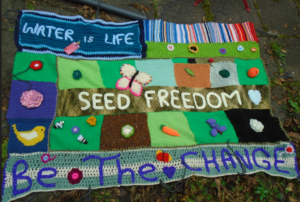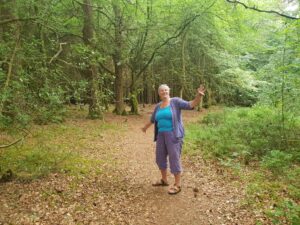Sustainability Story: Four Questions for Caroline Kuyper
Q1: Tell us about yourself, where in Donegal are you based and what things do like to do?
I live in Buncrana, Inishowen, Donegal. I like going for walks by the sea or anywhere else in nature, working in my garden, taking part in community activities, in particular creative ones like with Artlink, spending time with my grandchildren one afternoon a week, knit & crochet yarn bombs for change. Singing and reading.
I took part in the IMMA Eco Art Festival last October and I felt heartened by the many different creative approaches to ecological issues, how many people do care and do what they can, awareness raising, planting trees, rewilding, growing mushrooms, visioning the future, litter-picking etc. What is missing is urgent radical action by government and corporations and we need more truth telling by the mainstream media, whether that is highlighting the daily weather extremes in the wider context of rising CO2 or calling out Greenwashing etc.
Q2: What change making activities are you pursuing in your life at this time?
I grow some of my own food, I have a rainwater harvesting system (barrels) to water my garden, I use water in my house sparingly.
I compost my food waste.
I am learning about saving seeds and I give/share/swap them with folks in the area – seeds, seedlings and produce.
I am part of the Amach Anseo Community Garden at Dunree.
I use a bus whenever possible or walk to town, try use my car as little as possible, combine journeys & things to do when I do use the car. As I live up a hill, it’s about 25 minutes down, and 35 minutes up!
I pick up local litter regularly, sometimes as part of Buncrana Tidy Town Committee, sometimes on my own.
I sing in a local choir about climate change, biodiversity and social justice.
I co-set up Extinction Rebellion Donegal-Derry/Strabane and the Red Rebel XR Donegal group too.
I co-founded the Buncrana-Palestine solidarity group, regular stalls, info evenings & fundraisers and bulk buying Palestinian produce (olive oil, dates etc) yearly.
I am involved in the Inishowen against Goldmining campaign.
I am involved in the Action North Waste Campaign, about safe disposal of buried toxic waste dump at Bridgend and holding those responsible accountable.
I support the local organic farms (White Oaks and Bee Organic) buying their produce regularly when money permits.
I am involved with Derry Zero Waste as well as the Environmental Gathering in Derry.
I make yarn-bombs, (knit and crochet) to highlight ecological issues and raise awareness to hang in public spaces.
I am part of an informal group of people in the area that run occasional swap shops or passing on items of books, clothes and household items and ran a Repair café in the past etc. We are like a Transition Town collective.
Q3: How do you interact with ChangeMakers?
I did the original course at the start, then later did part of the facilitators course, I go to the seminars yearly and when possible, to workshops. I organised a zero waste training workshop, given by Rachel Dempsey, whom Changemakers had used.
They are ‘my tribe’, people who care about social and ecological justice, about human rights, global and local etc. I have learned a lot, been challenged, stimulated and encouraged.
Q4: What conversations would you like to pursue with the wider ChangeMakers community?
- Political economy: We need to name and understand the ideological economic model of neoliberalism – that harms planet and people- and increases inequality, in order to effectively challenge it. I know Trademark in Belfast run courses on it. Further info: http://trademarkbelfast.com/.
- Doughnut Economics. I took part in a workshop at IMMA on this alternative economic model, staying within ecological and social limits. The Irish Doughnut Economics Network offer training/workshops, I spoke to a woman, Mary from Transition Kerry, and Roisin from Wexford Environmental Network. Further info: https://doughnuteconomics.org/groups-and-networks/6
- We need to talk about local turf cutting! How it is a tradition and ‘free’, which matters to a largely poor population in rural Donegal, but how it’s costing the future in reality. How folk need to be fully supported to insulate their houses better (government aid) and use more sustainable alternative sources of fuel & value the bogs for the vital carbon sink it is!
- Wind-power/water power: Not the corporate profit-driven huge models, but smaller scale community owned and managed, not on the bogs (Meenabog landslide) etc.
- Tree-planting – yes, but native and varied. Not Sitka spruce monoculture plantations, laden with pesticides, as they are ecological dead zones.



